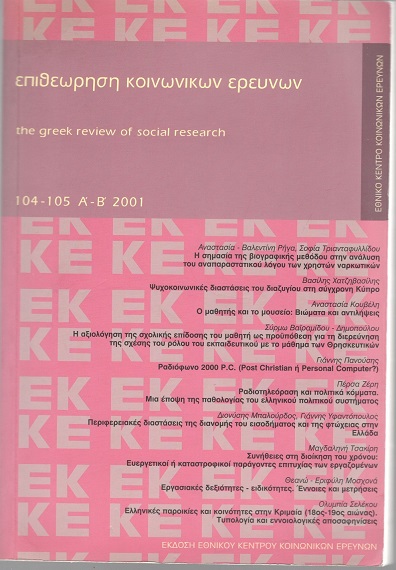Ραδιόφωνο 2000 P.C. (Post Christian ή Personal Computer?)
Abstract
Η «κοινωνικοποίηση» του ραδιοφώνου προϋποθέτει απεμπλοκή από την εξουσία
και μετατόπιση του προς την πολιτική παρέμβαση της κοινωνίας. Το ραδιόφωνο
συμβάλλει στην πολιτική διαπαιδαγώγηση και στην κοινωνική ηθική και δεν πρέπει
ν' ασχολείται με προπαγάνδα ή ολιγοπώλια. Σε μια δημοκρατία όλες οι κοινωνικές δυνάμεις πρέπει να μπορούν να εκφράζονται ισότιμα μέσω ραδιοφώνου, επιβεβαιώνοντας στην πράξη τη διαφορετικότητα των απόψεων και ιδεών (πολιτιστικός πλουραλισμός). Από την άλλη πλευρά, τα MME δεν πρέπει να λειτουργούν «κάθετα», δηλαδή να στέλνουν μηνύματα από τα πάνω προς τα κάτω, αλλά ν' ακολουθούν εναλλακτικές διαδρομές. Το ραδιόφωνο δίνει στον απομονωμένο ακροατή ένα αίσθημα επικοινωνίας και με τους άλλους απομονωμένους ακροατές, και με την έννοια αυτή μετουσιώνεται σε πραγματικό ανθρώπινο «δίκτυο».
Article Details
- How to Cite
-
Πανούσης Γ. (2001). Ραδιόφωνο 2000 P.C. (Post Christian ή Personal Computer?). The Greek Review of Social Research, 104, 121–131. https://doi.org/10.12681/grsr.8827
- Issue
- 2001: 104-105 A'-B'
- Section
- Articles

This work is licensed under a Creative Commons Attribution-NonCommercial 4.0 International License.
Authors who publish with this journal agree to the following terms:
- Authors retain copyright and grant the journal right of first publication with the work simultaneously licensed under a Creative Commons Attribution Non-Commercial License that allows others to share the work with an acknowledgement of the work's authorship and initial publication in this journal.
- Authors are able to enter into separate, additional contractual arrangements for the non-exclusive distribution of the journal's published version of the work (e.g. post it to an institutional repository or publish it in a book), with an acknowledgement of its initial publication in this journal.
- Authors are permitted and encouraged to post their work online (preferably in institutional repositories or on their website) prior to and during the submission process, as it can lead to productive exchanges, as well as earlier and greater citation of published work (See The Effect of Open Access).



